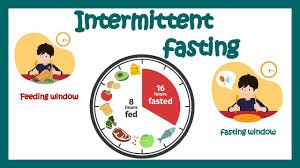The Benefits of Fasting On Your Health
For thousands of years, fasting has been practiced both as a religious tradition and a healing method. It involves abstaining from food for a specific period of time. In religious contexts, fasting supports spiritual growth, while historically, figures like Hippocrates used it to treat certain ailments.
Recently, intermittent fasting—particularly time-restricted eating—has gained widespread attention for its weight loss benefits. Many are adopting this lifestyle, but what are the specific advantages of fasting, and why should you consider integrating it into your routine?
Let’s explore the most notable benefits of fasting and how it can positively impact your health:
Weight Loss and Fat Reduction
When you fast, insulin levels decrease, allowing your body to more easily access stored fat for energy. With less frequent food intake, your body becomes more efficient at burning fat, making fasting a powerful tool for weight loss.
Improved Insulin Sensitivity
Poor insulin sensitivity can lead to insulin resistance, increasing the risk of diabetes. Fasting improves insulin function, helps stabilize blood sugar levels, and promotes better metabolic health overall.
Cellular Repair and Longevity
Fasting activates autophagy, a process where the body clears out damaged cells and regenerates new ones. During this "cellular housekeeping," cells repair themselves by removing and recycling damaged proteins. This process can enhance longevity and reduce the risk of chronic diseases by keeping cells functioning optimally.
Reduced Inflammation
Chronic inflammation is a key factor in many conditions, including heart disease, arthritis, and certain cancers. Fasting has been shown to reduce inflammation markers, potentially lowering disease risk and promoting overall health. By giving your digestive system a break, fasting allows your body to focus on repair, reducing oxidative stress and inflammation. This also boosts immune function and helps manage chronic inflammatory conditions.
Boosts Brain Function
Fasting offers several cognitive benefits. Research suggests that it enhances brain function, stimulates the growth of new neurons, and may protect against degenerative diseases. Fasting also improves mood and mental clarity by increasing brain-derived neurotrophic factor (BDNF), a protein that supports brain health.
Key Cognitive Benefits:
- Enhanced mental clarity and focus
- Increased BDNF production, which supports memory and learning
- Protection against neurodegenerative diseases like Alzheimer’s
These benefits are especially relevant to women in perimenopause, as estrogen levels fluctuate, affecting neurochemicals such as serotonin, dopamine, BDNF, and acetylcholine. Fasting can help boost the body’s production of these important chemicals.
Heart Health
Fasting has been shown to improve several cardiovascular risk factors, including blood pressure, cholesterol levels, triglycerides, and inflammation markers. Essentially, fasting helps heal the metabolism and supports heart health.
Mental and Emotional Benefits
Fasting also helps regulate hormones linked to hunger and mood, leading to improved emotional balance. By practicing mindful eating and becoming more attuned to hunger signals, many individuals experience greater control, a heightened sense of well-being, and even spiritual clarity during fasting periods.
The most well-known and widely practiced form of fasting is intermittent fasting. This method helps restore the body’s natural feast-and-famine cycle. To give some historical context, in primitive times, humans didn’t have constant access to food. They had to hunt and gather, often going long periods without knowing when or where their next meal would come from. During the winter months, food scarcity could last for days. Our bodies are so resilient that we can thrive without food for extended periods. When blood sugar and insulin levels drop low enough, the liver produces ketones. These ketones make humans more alert and energetic, driving the motivation to seek food.
In today’s world, with food constantly available, we often eat continuously, never giving the body a chance to switch to its alternate fuel system. By setting a clear eating window and a fasting window, you allow your body the time and space to function as it was designed. Start by gradually working up to 13-15 hours without food each day, leaving a 9-hour window for eating. In future posts, I’ll share strategies to help you compress your eating window into this 9-hour period.
Once you’ve mastered time-restricted eating, you can begin exploring extended fasting for increased health benefits. However, for women, this requires special care and training due to the sensitivity of the female hormonal cycle.
For instance, during the first part of the menstrual cycle (days 1-10), when estrogen is being produced, fasting is generally safe. In fact, estrogen benefits from stable blood sugar, so fasting and a low-carb (keto) eating style can help alleviate PMS symptoms like bloating, cramping, and heavy bleeding. However, during the second half of the cycle, it’s crucial not to fast or restrict carbohydrates. At this stage, progesterone is the dominant hormone, and it relies on glucose (carbohydrates) for optimal function. Since progesterone is sensitive to stress, and fasting is considered a form of hormetic stress, it’s not recommended during this time.
For more detailed information on managing fasting with your hormonal cycle, download my free Cycle Literacy Guide. Fasting can be a powerful tool for women, but it must be aligned with the natural fluctuations of your hormones.
Now, let’s explore the amazing benefits of various types fasting:
Fasting offers a wide array of benefits that extend beyond weight loss. From improving metabolic health to promoting brain function and longevity, fasting can be a powerful tool for enhancing your overall well-being. However, it’s important to approach fasting responsibly. I highly recommend speaking with your healthcare professional before starting any fasting regimen, especially if you have underlying health conditions. You should also consider hiring a health coach who is able to walk you through the process. When done correctly, fasting can be a transformative practice that not only improves your physical health but also supports your emotional and mental balance.
It’s not just fasting that is important. WHAT you eat in the eating window matters!!
Be sure to stay tuned for the next blog post on eating styles.
If you are interested in learning more now, joining the Inner Circle would be a great option for you.
The Inner Circle is a virtual coaching experience that offers you all the information and support you need to start creating a fasting lifestyle.




